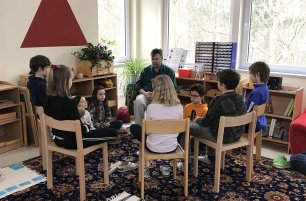Školní procházky a výlety
jako nezbytné zážitky a zkušenosti pro žáky základní Montessori školy
“Když jde dítě ven, je to svět sám, který se mu nabízí. Vezměme dítě ven, abychom mu ukázali skutečné věci, místo abychom vyráběli předměty, které je napodobují a zavírali je do vitrín.” – Dr. Maria Montessori.
Je brzy ráno, před 8 hodinou, a ve vestibulu IMSP se již začínají scházet studenti základní školy s batohy, spacáky a poznámkovými bloky. Dnes vyrážíme na třídenní noční exkurzi na český venkov, kde plánujeme se studenty zažít každodenní život na farmě. Po měsíci příprav a organizování jsou konečně připraveni vyjet přímo na farmu, kde si ušpiní ruce a alespoň na pár dní poznají život lidí pracujících na venkově.

Tuto, stejně jako většinu exkurzí, které zhruba jednou za měsíc organizujeme na základní škole, pečlivě naplánovali pod vedením učitele sami studenti. Na vícedenní exkurzi, jako je tato, musí studenti připravit plán, rozdělit pracovní místa, vymyslet jídelníček, objednat jídlo, zajistit dopravu a naplánovat ubytování na spaní.
Studenti se dobrovolně přihlásili do týmů, ve kterých museli promyslet každý detail exkurze. Studenti měli v rámci daného rozpočtu, vyjednat dodání všeho, co bylo pro exkurzi potřeba, domluvit dopravu i naplánovat jaké oblečení a osobí potřeby budou na přenocování potřebovat. Všechny tyto přípravy na exkurzi nabízejí studentům příležitost využít a zdokonalit mnoho dovedností, které se naučili ve třídě, a to konkrétním, reálným a praktickým způsobem. Při takovém plánování si zdokonalují také kritické myšlení, schopnosti stanovit si priority a organizační dovednosti, a díky tomu získávají zkušenosti, které dalece přesahují rámec třídy. A to je vedle všech ostatními zážitků důvod, proč venkovní exkurze stojí po všech stránkách opravdu za to.

Myšlenka opustit třídy během školního dne a nabídnout dětem realističtější a konkrétnější zkušenost a možnost prozkoumat témata, o kterých se ve škole učí v reálném světě, pochází již z doby počátků revoluční práce Marie Montessori s dětmi. She imagined elementary-aged children, fired-up and excited by their curiosity, bursting with questions, and thirsting for a deeper understanding and experience with the subject they were inspired by. Dr. Montessori conceived the idea of “going out” as a student-driven and organized activity, encouraged and guided by teachers, but for the experiential enhancement of the students.
Děti ve věku základní školy, zapálené, zvědavé a překypující otázkami a žíznící po hlubším porozumění a prožitku s tématem, které je inspirovalo. Dr. Montessori pojala myšlenku „chodit ven“ jako studentem řízenou a organizovanou aktivitu, podporovanou a vedenou učiteli, ale pro zdokonalování zkušeností studentů.

The practice of going out offers the students the opportunity to not only experience real-world circumstances, but it gives them the chance to practice many of the skills they are learning in the classroom, such as grace and courtesy, organization and planning, responsible social interactions, cooperation, and resilience. They learn in the process how to overcome difficulties by agreeing on the goals they want to achieve, and then working together to meet those goals.
As they research, they may find that they need to adjust plans, rethink assumptions, and negotiate with others to make their plans work. They need to make decisions that take into account the needs of everyone involved, including their teachers and other adults who are involved. They need to consider details and make sure that every realistic contingency that they can imagine has been considered. This is a very empowering process, where students learn how to work through problems and find solutions. In the process, they learn a lot about themselves as well.

Of course, as part of our mission in the Elementary, the students have a chance to go out on a field trip each month. In the Lower Elementary, the teachers take the lead as they guide the students through a variety of experiences, from visiting the planetarium as part of their study of astronomy, doing prep work in a commercial kitchen to learn about snacks and foods from around the world, and fossil hunting for evidence of ancient organisms from prehistoric Prague.
These hands-on experiences enhance not only the Montessori Elementary students' understanding of the subject that is the theme of the field trip, but it widens their understanding of how all of these activities fit in the world, and plants seeds of inspiration and curiosity that can lead to lifelong participation. With this kind of experience in learning, as Dr. Montessori wrote;
“Instruction becomes a living thing. Instead of being illustrated, it is brought to life. In a word, the outing is a new key for the intensification of instruction ordinarily given in the school.” --- Dr. Maria Montessori.

This interconnectedness that the students experience is an invaluable element in the Montessori cosmic curriculum, which is designed to offer each student, as much as possible, a holistic whole-world view. While the work and learning the children do in the classroom is essential, the experiences they have on field trips nurture their curiosity and often inspire deeper understanding and a desire to learn even more. The hands-on experience of hammering rocks while looking for fossils, or rolling dough to make pastries, or mucking out stalls and feeding cows and chickens, can’t be replicated by three-part cards and research. All of these activities offer the child an opportunity for “deep learning,” – experiential learning that touches them not just intellectually but physically and spiritually.

One of Maria Montessori’s most famous sayings is, “The child learns through the hands.” What better way than for children to learn than to discover the texture and smell of the lanolin in sheep's wool, the crevices and roughness of a newly discovered (by them) trilobite fossil, or the gratefulness of a calf that they have fed as it nuzzles against them as they stand by the corral? These are precious experiences for every child, ones that help them see things in a new way, and sometimes, positively enhance the way they see our world completely.
By Joyce McCusker and Greg McCracken
Chcete se dozvědět více? Přečtěte si náš další článek:




